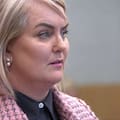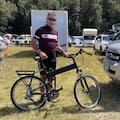Auckland councillor Julie Fairey has become accustomed to abusive comments — but she was still shocked by what she saw on social media after she was hit by a car while cycling and suffered a broken leg.
Fairey has spent several years in local politics — and has been called all sorts of things.
"I've been called communist scum, which I find interesting.
"I get a fair bit of abuse about my husband, who is a former cabinet minister, that I'm just his appendage and not my own person, which is difficult. We've both been involved in politics for a long time, well before we were together."
But she was still surprised by the cruelty of some of the comments she saw after she was hit by a car while cycling in Sandringham earlier this year.
"People were basically one step on from blaming me. It was like I deserved it and that it would be nice if they finished the job or if it happened again, and that's hard to read.
"How could another human being write that to another person? You're making this comment about someone, an actual person. How could you wish such ill on anybody? To me, it just seems cruel, and I don't understand it.
"I've been doing this a long time, and a lot of it doesn't bother me, although probably it should. But what bothers me is the idea that my kids or my mother might see it, and that would be upsetting for them, and that's not okay."
When Auckland Council surveyed last term's councillors and local board members, 81% of those who responded said they had been harassed or bullied by members of the public.
Sixty-five percent had been abused or harassed online, with the majority of those targeted being women.
Thirty-three out of 170 members responded to the survey done in April, which was released to RNZ last week.
Councillor Fairey said her fellow councillors who are women — particularly women of colour — often received more abuse than their male counterparts.
"For women, there tends to be more appearance-based attacks. It's not something I've had to deal with too much, being of a smaller size and having pale skin. But I've seen colleagues and friends be told to shut up because they're fat or things of that nature.
"I have several friends who would make great local government elected members who have told me straight that they will not stand because of the fear of abuse. These are staunch women with plenty of useful experience that they could bring to the table, some of them in day jobs or volunteer work where they have stood up to power in the past and they're not prepared to put themselves up for the election process because of the harassment they know they'll face, in particular online, and they way that sometimes people's family members can be targeted as well."
She challenged the idea that elected members should have to put up with vicious comments, including from each other.
"I have colleagues who, the way they feel about it, is that if it's too hot, get out of the kitchen. But actually, the kitchen shouldn't be that hot.
"Politicians have a role in bringing down the temperature themselves. Often, the narratives we engage with publicly heat things up, and we need to exhibit the kinds of standards we expect from the community and not make attacks on other people, be they staff, the organisation, or other elected members that are really personal and hurtful."
Sixty-nine percent of the 33 people who responded to the survey said they had been targeted by fellow elected members.
Fairey said that as of last term, the council started using a platform called Done Safe, where members can report comments that cross the line or persistent abuse.
The morning's headlines in 90 seconds, including a dramatic late night rescue in a posh Auckland suburb, the White House says Elon Musk’s pet project doesn’t exist, and what Britain’s PM thinks former prince Andrew should do now. (Source: Breakfast)
Councillor Alf Filipaina said he was not active on social media but had received a few odd emails about his support for Māori wards.
"They say things like you're being divisive, you're disgusting. But who cares, I just ignore them."
Another councillor Andy Baker said he avoided social media because of personal attacks.
"I don't live my life on social media and at times have taken myself off platforms because I was sick of the comments, just in general, how ridiculous some of them are.
"But it is an issue, and some of the comments can be so nasty, so personal, they'll say 'you're just a dickhead' and use abusive language.
"We can debate and disagree on issues, but when it becomes personal and sometimes they attack family, it just steps over that line."
Baker said that working as a police officer gave him thick skin.
"Someone pulled a knife on me, I got shot at, so these sorts of comments are inane to me. I actually laugh at them. Deleted and blocked them and moved on."
He agreed that councillors needed to watch their own behaviour.
"We're not perfect either, in meetings some of my colleagues will climb into staff knowing they can't respond."
Councillor John Watson said the conduct around the council table could be appalling.
"The council has to look at itself before it even starts to look at the public. It should be encouraging a far higher standard of discourse amongst elected members. People have different points of view, and they're entitled to say them, but they should be respectful.
"Walking the talk and leading by example is a good way of ensuring that quite disturbing behaviour being signalled through this survey isn't normalised."
Council spokesperson Lou-Ann Ballantyne said the level of intimidation and threats was worrying.
She said the council had taken actions, including de-escalation training for members and promoting the need to log incidents.
"We acknowledge there's more to do, and we're working through a range of possible tactics to help improve elected member safety and wellbeing as we go forward."
Local Government [LGNZ] vice president and Gisborne mayor Rehette Stolz said the problem was nationwide.
She said they had seen many examples of local and central government politicians being abused, including herself.
"People sometimes talk to you in a way that is inappropriate. They send messages about how useless you are, that your council is a bunch of losers, or to 'go back to where you came from'.
"People put their names forward for local and central government to serve their communities, and everyone has the right to be treated with respect."
She hoped recent changes to stalking and harassment legislation would improve safety for councillors across the country.
"LGNZ have been active in supporting members who are victims of abuse and worked closely to get this legislation across the line. Now it's gone through the house, we'll support members to know what this means for them, and how they can use it to make sure they are safe and respected."
By Jessica Hopkins of rnz.co.nz





















SHARE ME